Consultation response GUIDE
The consultation into the banning of some of the most polluting single-use plastics is a welcome and much-needed step to address our plastics crisis. With the long-awaited consultation now open, we need to make sure that our voices are heard, and the government have no excuse for watering down their promises or creating loopholes in what they deliver.
We need your help to get this over the line.
We need as many people to complete the consultation as possible, sending a signal to government that they can’t ignore.
We know government consultations can be hard to digest so, working with 38 Degrees, we’ve created a simple form to fill out that will then be sent to DEFRA in response to their consultation.
To make this even easier, we’ve drafted some “template” answers to specific questions that we think best capture our support for this ban and where we think we need to raise legitimate concerns. It’s quick, easy and, most importantly, it will make sure DEFRA listens to us. The following page sets out the questions you’ll be asked with some suggestions for how you could respond. These answers can of course be used or adapted to form the basis of your own views. Ultimately we want to make sure your voice is heard and your opinions are shared.
Thank you for being part of this wave of change!
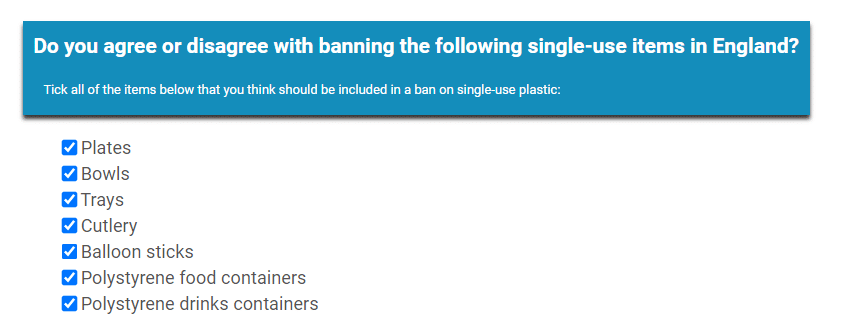
Do you agree or disagree with banning the following single-use items in England?
Tick all of the below boxes.
If you’d like to, please explain why
The items listed reflect the remaining items that have yet to be banned in England that are included under Article 5 of the EU Single-Use Plastic Directive.
The banning of the items on this list is a commonly understood minimum standard and just a first step in the much bigger challenge of tackling plastic pollution. Anything short of complete compliance of these minimum standards then would leave England falling behind our neighbouring countries.
The inclusion of these item in the EU Single-Use Directive is significant. The European Commission identified them as some of the most polluting on beaches and in rivers across Europe, whilst also recognising them as some of the most easily removed or replaced from internal markets. As such, these items are both highly polluting but also easily replaceable.
In England alone every year we use:
- 1 billion single-use plates
- 25 billion items of single-use cutlery
- 475 million cups and 679 million boxes, trays, cones, and pots made from expanded and extruded polystyrene
It is with this in mind that we support the most comprehensive policy possible to remove these items from market. Although not specified here, we would also support the inclusion of Oxo-degradable plastic items as well. These two could and should be removed with minimum impact on business.
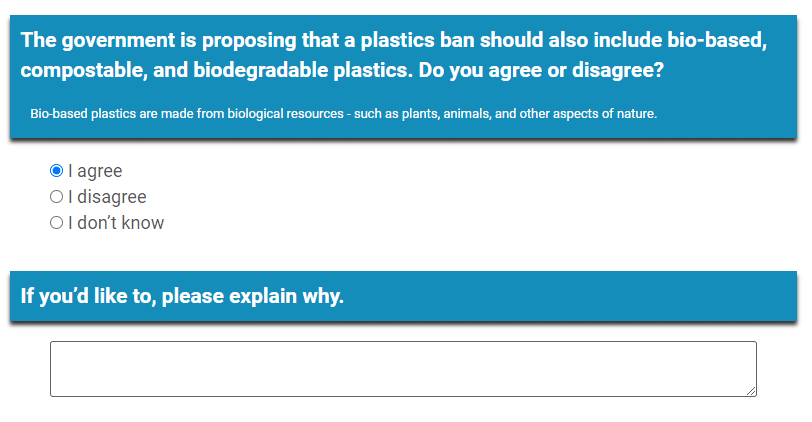
The government is proposing that a plastics ban should also include bio-based, compostable, and biodegradable plastics. Do you agree or disagree?
Tick I agree.
If you’d like to, please explain why
Instead of addressing our disposable, single-use culture which is creating mountains of completely avoidable waste, bioplastics or compostable plastics are a distraction. They are confusing for businesses and consumers who are greenwashed into thinking they are more sustainable, when in reality, most bioplastics cause vast environmental damage and actually have a detrimental impact on recycling rates and systems. When bioplastics, or compostable plastics enter the natural environment or our oceans, they behave in the same way fossil-fuel based plastics would and can have a harmful impact on wildlife.
As such, where there are clear alternatives, ideally reusable packaging solutions, bioplastics should be banned alongside conventional fossil fuel-based plastics.
The bioplastics that are commercially compostable, as opposed to home composted, require industrial composters called in-vessel composters and there are currently only around 18 in the UK. These sites also only accept waste that’s guaranteed not to be contaminated by oil-based plastics. This means only venues and sites with closed waste streams (like festivals or bars) should be licensed to use these materials. Even then, it must be only when reusable alternatives are not possible. This, by definition, excludes these materials as being appropriate for the majority of take-away packaging solutions.
Lastly, we note the lack of commonly understood definitions for these terms that lead to wide-spread confusion from business and consumers alike. This can, and already does, hamper buy-in from stakeholders who are trying to do the right thing.
Through this consultation we have an opportunity to provide clear regulatory guidance to guide people away from harmful bioplastics and towards sustainable practices around reduction, reuse and refill that fit clearly within government’s ambitions for a circular economy.
For more please see City to Sea’s Takeaway packaging and guidance on bioplastics.
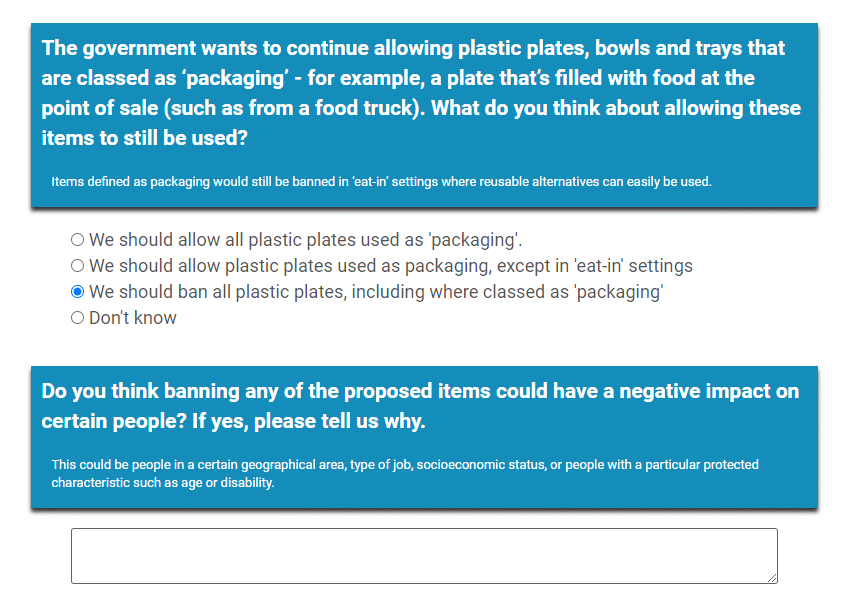
We believe that government should listen to and engage directly with groups who may be affected negatively by any proposed policies. We note common sense exemptions in previous policies such as the banning of plastic straws that respects people’s needs while also not significantly watering down these important environmental policies.
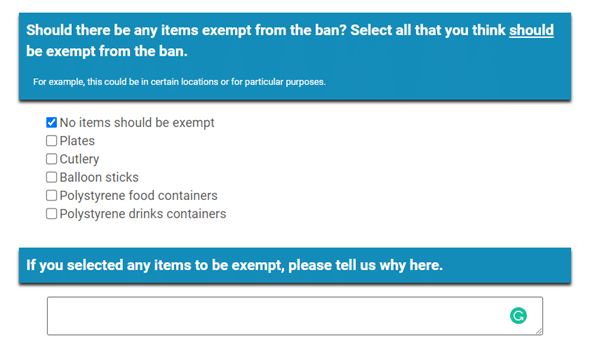
Should there be any items exempt from the ban? Select all that you think should be exempt from the ban.
Tick “No items should be exempt”
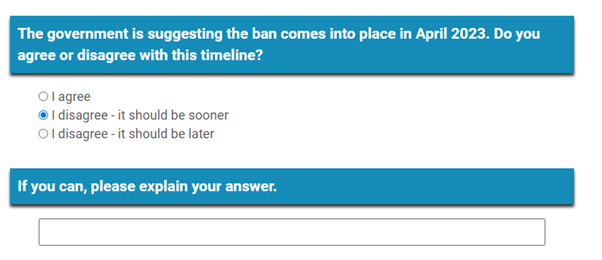
The government is suggesting the ban comes into place in April 2023. Do you agree or disagree with this timeline?
Tick “I disagree – it should be sooner”
If you can, please explain your answer.
If anything, this timeline is too generous. Industry has known that these measures were on the cards since the EU Single-Use Directive was passed in 2019. Indeed, it not only keeps England out of step with the rest of Europe but also with other home nations. Scotland has announced they are planning on introducing such measures by June 2022. Industry requires consistency and clear direction. They have received this and now need a level playing field across both the Single Market but also the UK’s internal market.
Considering the environmental crisis we face, and the importance of market confidence, it is essential that you bring this date forward to at least June 2022.
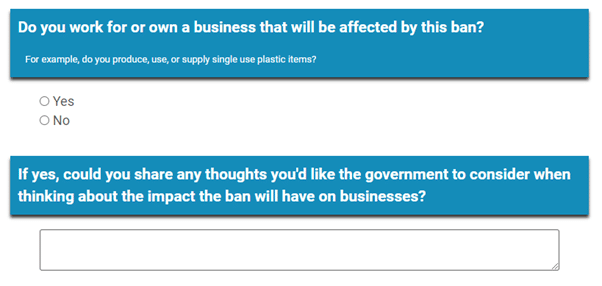
Please share your thoughts and personal experiences of how your business has reduced plastic.

We don’t believe the cost should be passed onto consumers or have to be absorbed by small businesses. We believe that the government needs ensure this is addressed by relevant policies.

We need to address our current disposable, single-use culture and reduce waste by looking for upstream solutions. We need to avoid single-use replacements where possible and there needs to be a wholesale shift to incentivising refill and reuse. We need to be looking to transition at least 50% of current single-use packaging currently on market to refill and reuse systems.

The discussion around plastic pollution tends to focus on marine plastic. And this is important. It is estimated that 1.5–4.5% of all global plastics production ends up in the ocean every year.
However, plastics also has a significant impact on GHG emissions, biodiversity loss as well as a significant financial impact on government (both local and national), business and wider society. These wider costs should not be forgotten.

